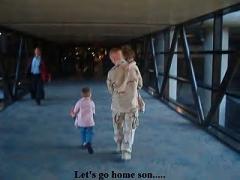Experts say growing numbers of former servicemen and women -- wracked by post-traumatic stress disorder and brain injuries and struggling with substance abuse and other ills -- are winding up on the streets.
It is a problem that military and Veterans Affairs officials and homeless advocates are struggling to cope with. A Department of Defense task force reported last week that "the military system does not have enough resources, funding or personnel to adequately support the psychological health of service members and their families in peace and during conflict."
From 2004 to 2006 -- the most current data available -- the U.S. Department of Veterans Affairs identified as homeless 1,049 service members who served in the current fighting in either Iraq or Afghanistan.
"It certainly is higher" than expected, said Peter Dougherty, director of homeless veterans programs for the federal agency.
At least 300 veterans of those ongoing conflicts are homeless any given night, according to Veterans Affairs. The tally is a fraction of the more than 400,000 service members who have returned from Iraq and Afghanistan, and of the total number of veterans on the street.
Total homeless veterans number 200,000 nationwide, Veterans Affairs estimates. Almost half, 47 percent, served in the Vietnam War, according to the National Coalition for Homeless Veterans.
But advocates and Veterans Affairs officials alike expect the ranks of new homeless veterans to swell in the next few years in part because of increasingly long deployments and the nature of combat in Iraq, where insurgent attacks make everywhere the front lines and no real safe zones exist.
Other reasons, some say, include the military's failure to properly screen troops for combat-related mental problems, a benefits system that is overly bureaucratic and increasingly overwhelmed by claims, and the fact that many members of the military are reluctant to seek help.
"If someone had set about trying to put together a recipe for PTSD and homelessness, they really couldn't have done better," said Amy Fairweather of Swords to Plowshares, a San Francisco-based nonprofit group. The group provides counseling, housing and other services for veterans and advocates on their behalf.
While the United States has no female troops in designated combat roles, the psychological scars of serving in a place where anyone is subject to attack are apparent. Nearly 12 percent of all homeless veterans of the ongoing conflicts are women, compared to just 4 percent from the Vietnam War, in which women served as nurses and other roles behind the front lines, Dougherty said.
Read entire article here GETTING HELP For more information on veterans and homelessness: The U.S. Department of Veterans Affairs 1-800-827-1000 http://www1.va.gov/homeless/ The National Coalition for Homeless Veterans 1-800-VET-HELP

No comments:
Post a Comment